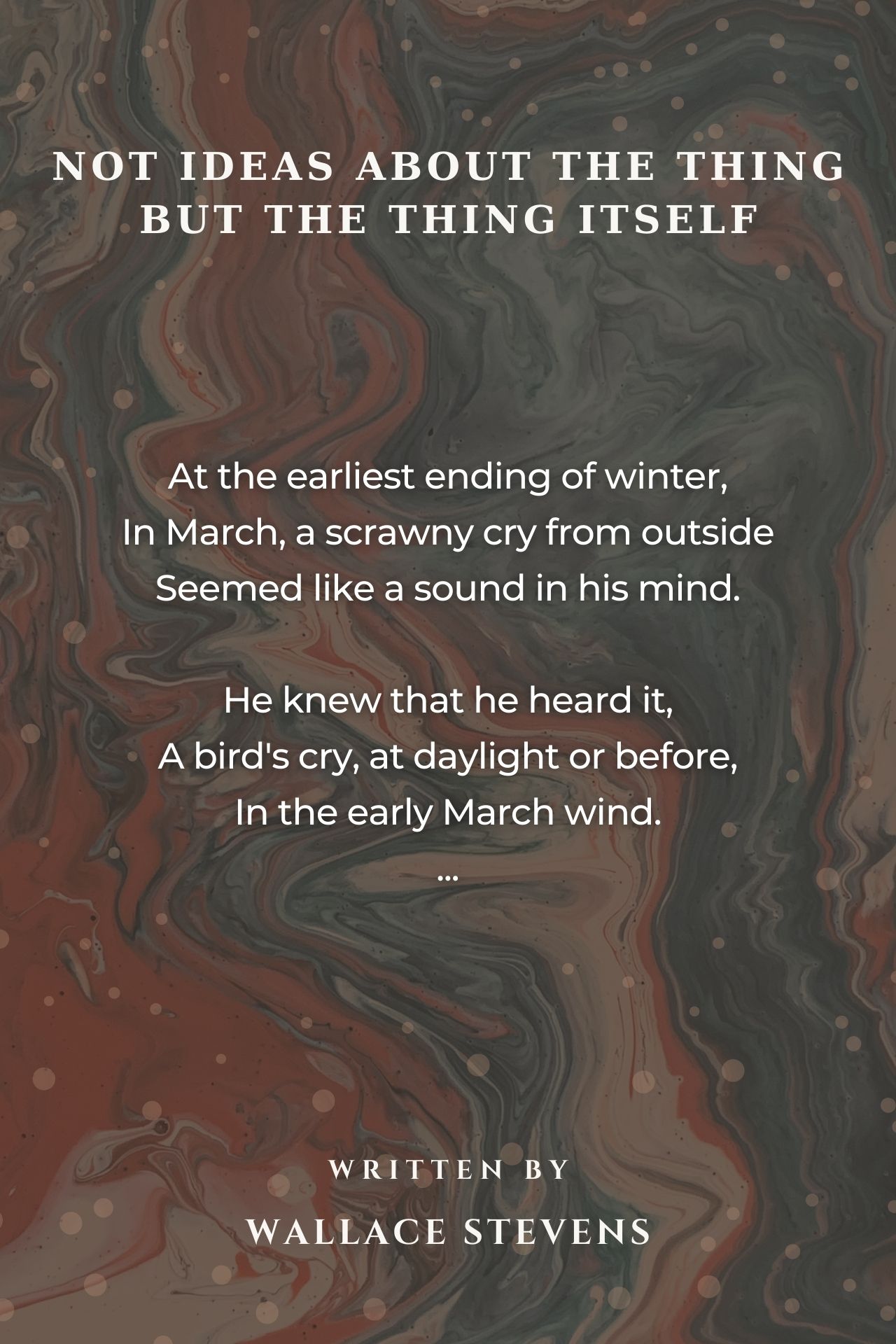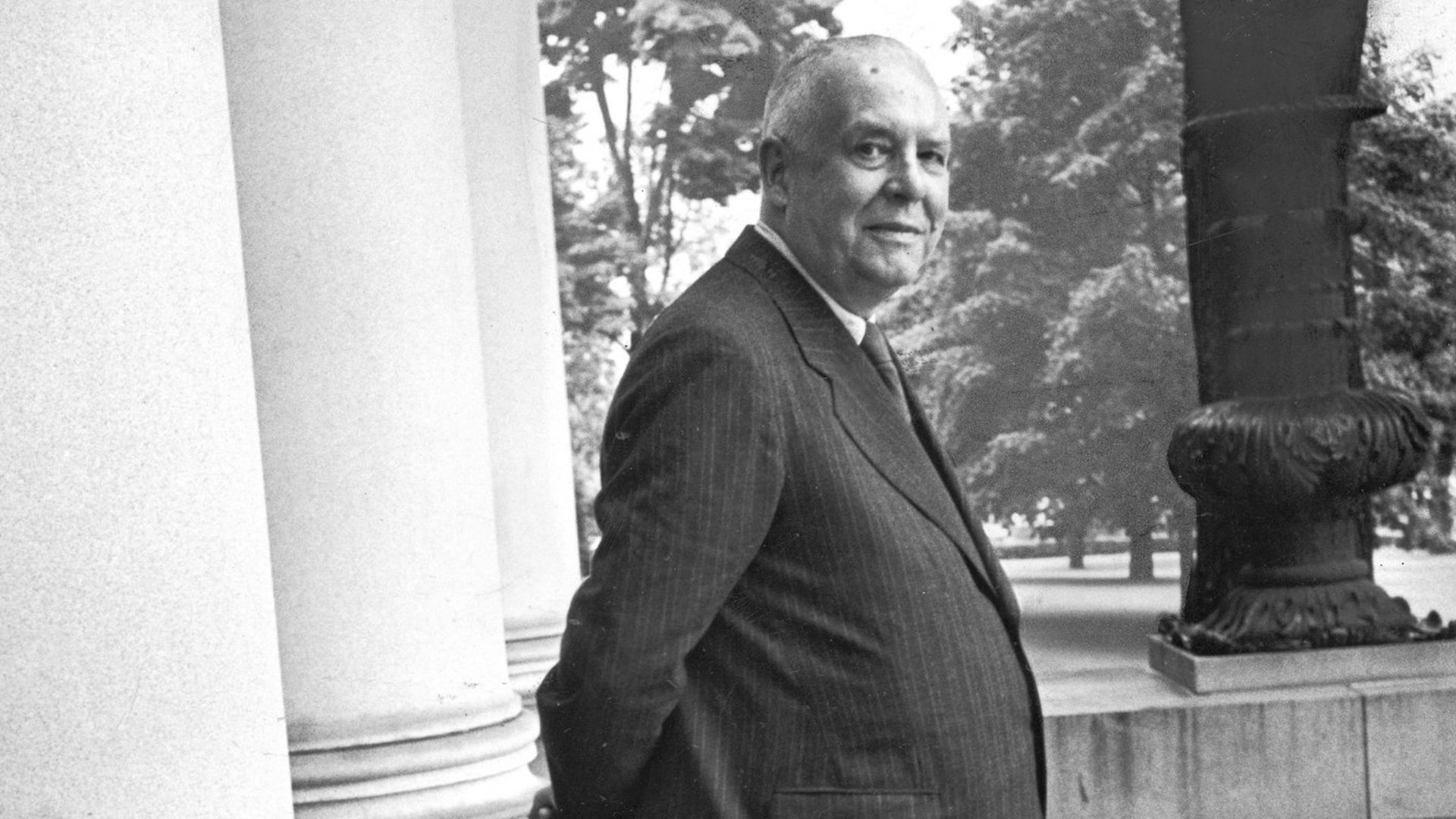Not Ideas About The Thing But The Thing Itself Poem by Wallace Stevens
Not Ideas About The Thing But The Thing Itself
At the earliest ending of winter,
In March, a scrawny cry from outside
Seemed like a sound in his mind.
He knew that he heard it,
A bird's cry, at daylight or before,
In the early March wind.
The sun was rising at six,
No longer a battered panache above snow...
It would have been outside.
It was not from the vast ventriloquism
Of sleep's faded papier-mache...
The sun was coming from the outside.
That scrawny cry- It was
A chorister whose c preceded the choir.
It was part of the colossal sun,
Surrounded by its choral rings,
Still far away. It was like
A new knowledge of reality.

Love of nature and it's beauty well depicted in this classic poem. Nice piece.
weather change plus early rising sun...good for plants to bloom
Exquisite write about the benevolent nature's different appearances at different times in an year. Enjoyed the poem. Thanks for sharing.10 points.
quite enlightening and no doubt humbling it was to find warmth in that birdcall
By the way Gary Witt's analysis is highly insteresting. I would say more than good enough for any literature magazine. Thank you for your excellent comments. Paul
I always found the work of this man highly imaginative. I am simply fascinated at his choice of situations that we all can imagine however never think of.
This poem has not been translated into any other language yet.
I would like to translate this poem
The first thing that came to mind when I read the title of this poem was Plato’s allegory of the cave (Republic, Book VII) in which people are prisoners in an underground den, viewing shadows on the wall, believing those shadows are reality, and unable to turn around to discover the truth. In the same manner, we humans here on earth can see only “forms” and not “the thing itself.” What I find most interesting in this poem are the places where Plato and Stevens seem to intersect, and the places where they clearly diverge. The poem is very time-specific. It is dawn in March, the early end of winter. Stevens finds this important enough to repeat. The poet-narrator hears a bird’s “scrawny cry from outside.” At first it “[s]eemed like a sound in his mind.” But he “knew” that he heard it. It wasn’t just his imagination. The sun was rising at six, “no longer a battered panache above snow, ” and the sound of the bird’s cry “was not from the vast ventriloquism /Of sleep's faded papier-mache...” The sound was real. Indeed, the falseness of “sleep’s faded papier-mache, ” and of its “vast ventriloquism, ” seems rather transparent here. The poet-narrator is not fooled by either of them. So, unlike Plato, Stevens believes at some level or to some extent that we can trust our senses. The bird’s cry was real. But I find the element of time here also very significant. What the poet-narrator sees as Truth is true while the sun is rising in March at the earliest end of winter. But things change. What is true now may not be true tomorrow. The sun doesn’t always rise at six; moreover, the sun itself used to appear as “a battered panache above snow, ” but it no longer does. One can never dip one's hands into the same river twice. As part of his allegory, Plato proposes the existence of a “final” or “ultimate” Truth that people may see, gradually, if they are let out of their cave. It appears this might be one point at which Plato and Stevens part company. I don’t believe Stevens finds the possibility of a “final truth” acceptable. Truth depends upon When (among other factors) . IMHO, the last two stanzas here present a substantial challenge, because they seem to toss most of Plato out the window. The bird’s scrawny cry “was/ A chorister whose c preceded the choir./ It was part of the colossal sun, //Surrounded by its choral rings, / Still far away.” At first blush, both of these images (chorister and sun) look strictly like “ideas about the thing, ” and not the thing itself. The reader is tempted to turn to Stevens and say, “What gives? ” But consider this as perhaps one possibility. Both of these images are relational, or metaphorical. Truth is not just perceived in the senses; it is comprehended by and through the imagination. One cannot grasp truth in a vacuum or in piece-part. Truth is relational, not in the sense that truth means different things to different people, but in the sense that one must comprehend truth in relation to other parts of reality—the sun at dawn, in March, for example. Metaphor is one tool that the imagination uses to grasp the relationship between one part of reality and another. So, per Stevens, not only can we trust our senses, but we are compelled to use our imaginations if we are to find truth. When we do, the result is like a new knowledge of reality. It is like finding the thing itself.